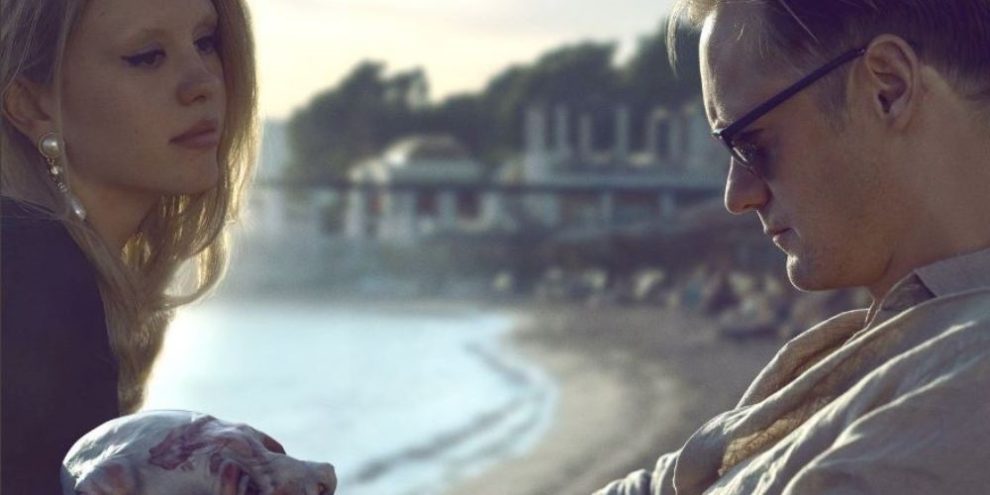
By Krysta Fauria in Los Angeles - The Associated Press
If you’re stumped about how to spend this Mother’s Day, consider relishing a good scare. Since the genre's inception, horror movies have tapped into the psychological trauma and terror that can only come from a mother, and a number of recent films are embracing that time-honored tradition.
Take, for example, Brandon Cronenberg’s “Infinity Pool,” which became one of the buzziest films to come out of this year's Sundance Film Festival.
It’s no surprise it was replete with disturbing moments. The director, after all, has surely learned a thing or two from his filmmaker dad and giant of the genre, David Cronenberg.
In one talked-about scene, Gabi (Mia Goth) exposes her bare chest to James (Alexander Skarsgård) in an invitation to breastfeed, revealing a complicated tension between his actual mother and his understanding of Gabi as his new one.
While the genre has often been dismissed as low-brow, Adam Lowenstein, a film and media studies professor at the University of Pittsburgh who specializes in horror, said it is well-suited for grappling with these kinds of deep-seated, psychological issues.
“Horror is, at its core, a very primal genre,” he said. “It makes absolute sense that things like family, sex, death would all be things that the horror film is constantly mining because those are primal fascinations and experiences.”
Perhaps the seminal example of mommy issues in a horror film is Alfred Hitchcock’s “Psycho” (1960).
In it, the infamous Norman Bates of the Bates Motel develops a split personality after killing his controlling mom and her lover out of jealousy. His grief and guilt cause him to keep her corpse stashed away, and assume her personality when he commits violence against women he becomes attracted to.
Part of what makes the maternal bond such a fertile one for exploring psychological trauma, Lowenstein said, is that it is so universal and freighted.
“We all have real mothers, just the way we have real constructs about motherhood that we subscribe to. And these things are very hard to separate,” he said. The gap between expectation and reality becomes fruitful territory for a good scare.
Zach Cregger’s “Barbarian” (2022) also turns breastfeeding into a spectacle, not from an inviting yet depraved sexual partner as in “Infinity Pool,” but from a monstrous maternal creature who forces her victims to feast.
Other films let the dynamic between mother and child carry the drama. “ Evil Dead Rise,” now available to rent on streaming services, plays with the fear-inducing extreme of a mom being possessed by a demon.
“I think it’s very terrifying to imagine somebody so familiar to you in your world becoming a subversion of that, and becoming something really dangerous and evil,” said director Lee Cronin. “It just lent itself to this exploration of maternal fears and what it might mean if your mother was to turn on you.”
In Ari Aster's new “Beau is Afraid,” the central theme is the fear and pain that can come from the mother-child bond. The movie – about a man trying to get to his mom’s house – is as much a surrealist epic as it is a horror movie.
And while Aster's third movie is admittedly less scary than his “Midsommar” or “Hereditary,” another film that exploits the terrors of family dynamics and mother-induced trauma, it is safe to conclude by the end that Beau’s fear of his guilt-inducing mother was warranted.
“When I left ‘Beau Is Afraid,’ I heard a teenage woman ahead of me walking out of the theater saying to her friends, ‘That just made me want to call my mom and say I’m sorry for everything,’” Lowenstein recounted. “We think horror and we think fear and dread and haunting, but we don’t necessarily think guilt, shame, humiliation. And Ari Aster clearly understands the connection between these things.”
It is not insignificant that almost all of these scary movies about protagonists’ relationships with their mothers are directed by men.
But Lowenstein maintains that the genre’s mommy issues began with a woman, and long before film: Mary Shelley's classic 1818 horror novel, “Frankenstein,” is often considered to be the inception of modern horror.
“Her story is about a man who wants to be God, but he also wants to be a mother. Really, he wants to create life without the intervention of women,” he said. “What Mary Shelley shows us is what a bad idea this really is, and how male hubris really does monstrous things with motherhood.”
Banner image: This image released by Elevation Pictures shows Mia Goth, left, and Alexander Skarsgard in a scene from "Infinity Pool." (Elevation Pictures via AP)





